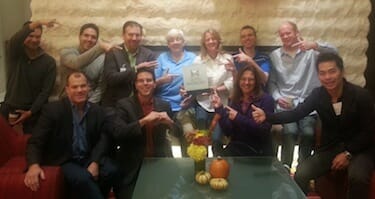Why Where You Don’t Work Is as Important as Where You Do
Startups that “dream” together grow together.
That’s our hypothesis at the Points of Light Civic Accelerator, a 12-week boot camp-style program that supports and invests in seed-stage “civic ventures,” or startups that engage people to solve pressing social issues in our communities.

Midtown to unwind.
In our newest partnership with Hilton Worldwide, the 15 ventures in the fall 2013 Civic Accelerator will not only spend intensive daytime hours working together on their startups, but they’ll also kick back, relax and “dream” alongside their peers during weeklong meetings in Atlanta, Silicon Valley and New York City over the next three months.
In the first year of the Civic Accelerator, we made a number of small (and sometimes big) bets to determine the right quantity and mix of startup ingredients – capital, entrepreneurial education, mentoring, peer collaboration, introductions to investors and others – that would allow for our ventures to successfully attract investment and scale their social innovation.
One, perhaps critical, ingredient was not so obvious at first – space. We don’t mean space in the literal square-footage, work-area sense. But rather, we’re referring to “no-working” space:
No-working space
nō -ˈwərkiNG spas
noun
A regenerative space to unwind and connect meaningfully with a peer or colleague over a warm drink on a comfy couch, instead of over a business-model canvas, surrounded by a rainbow of post-its.
Early feedback from our first two accelerator classes indicated a strong desire for more unstructured time together in such “no-working” spaces where they could interact and interplay with like-minded peers on all sorts of topics, not just their ventures. Externally, we’ve seen this trend reinforced through initiatives such as the Social Impact House at the University of Pennsylvania, and Krash, which provides turnkey living communities exclusively for entrepreneurs and innovators in Chicago, Boston and New York.
We recently completed our first intensive meeting in Atlanta, during which the majority of our entrepreneurs stayed under one roof at the Hilton Garden Inn Atlanta Midtown. Many of the entrepreneurs in our program immediately took advantage of the no-working space to share a toast of their first pitch, invite a new friend on a walk around Atlanta or squeeze in additional time providing feedback to another venture. (OK, so it’s not 100 percent no-working…)
We’ll continue to test this hypothesis on the importance of shared, no-working space over the next few months, and hope to report back with stories of startup serendipity, midnight epiphanies and maybe even a pillow fight (or two).
How do you create no-working space in your accelerator or startup organization? We’d love to learn from you. Leave a comment, or say “hello” at [email protected].
